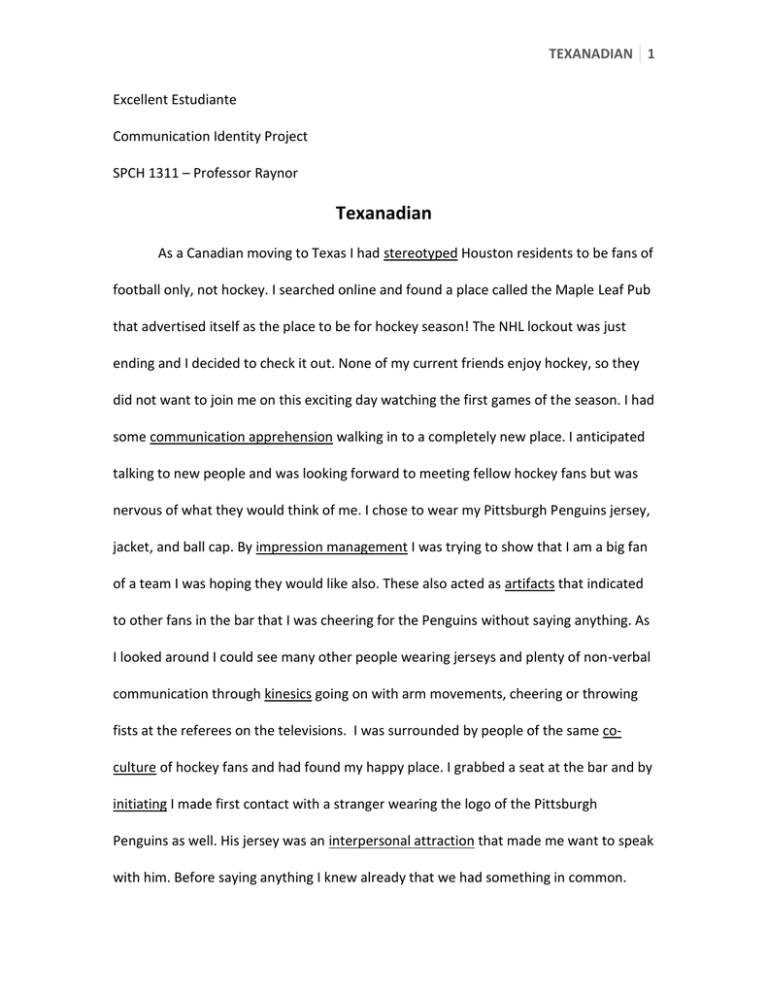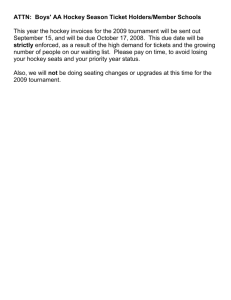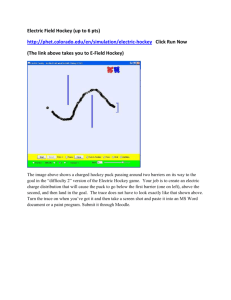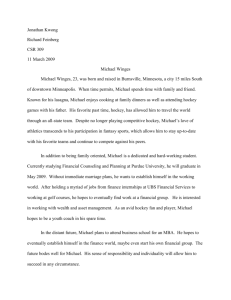Texanadian
advertisement

TEXANADIAN 1 Excellent Estudiante Communication Identity Project SPCH 1311 – Professor Raynor Texanadian As a Canadian moving to Texas I had stereotyped Houston residents to be fans of football only, not hockey. I searched online and found a place called the Maple Leaf Pub that advertised itself as the place to be for hockey season! The NHL lockout was just ending and I decided to check it out. None of my current friends enjoy hockey, so they did not want to join me on this exciting day watching the first games of the season. I had some communication apprehension walking in to a completely new place. I anticipated talking to new people and was looking forward to meeting fellow hockey fans but was nervous of what they would think of me. I chose to wear my Pittsburgh Penguins jersey, jacket, and ball cap. By impression management I was trying to show that I am a big fan of a team I was hoping they would like also. These also acted as artifacts that indicated to other fans in the bar that I was cheering for the Penguins without saying anything. As I looked around I could see many other people wearing jerseys and plenty of non-verbal communication through kinesics going on with arm movements, cheering or throwing fists at the referees on the televisions. I was surrounded by people of the same coculture of hockey fans and had found my happy place. I grabbed a seat at the bar and by initiating I made first contact with a stranger wearing the logo of the Pittsburgh Penguins as well. His jersey was an interpersonal attraction that made me want to speak with him. Before saying anything I knew already that we had something in common. TEXANADIAN 2 Through experimenting we made small talk about recent trades and what we expected of this year’s season. He mentioned it was odd to see a female with such vast hockey knowledge, suggesting it is a gender expectation of society for males to be hockey fans, not females. When his friends arrived he moved to a small table with them and invited me to join. This moved our conversations from on-on-one interpersonal communication to a small group orientation. In this group we were all able to use jargon specific to hockey like crosschecking and hat-tricks. As the bar was quite full, we took turns buying pitchers of beer to share. This collectivist orientation put aside our individual preferences so each person didn’t have to go up on their own and also, one person would not have the tab, we all split it. Throughout the games we were watching, everyone at the table was sharing information and telling stories. These self-disclosures helped me get to know them and my own disclosures allowed them to get to know me. The group was made up of friends from all over the country, or more specifically, continent. There are some words that would give up my Canadian status and I chose to use. I am very proud to be Canadian and by divergence I continued to use words like “eh”. The paralanguage throughout the group was greatly affected by the atmosphere. The excitement and crowd caused people to yell to both show their excitement about each game and also so friends could hear one another over the cheers of people around them. As the games wrapped up it was time for everyone to part ways. I enjoyed getting to know these people so at the exit stage of uncertainty reduction theory we exchanged numbers and decided we would all meet there for another game.





